#trans pat
Text
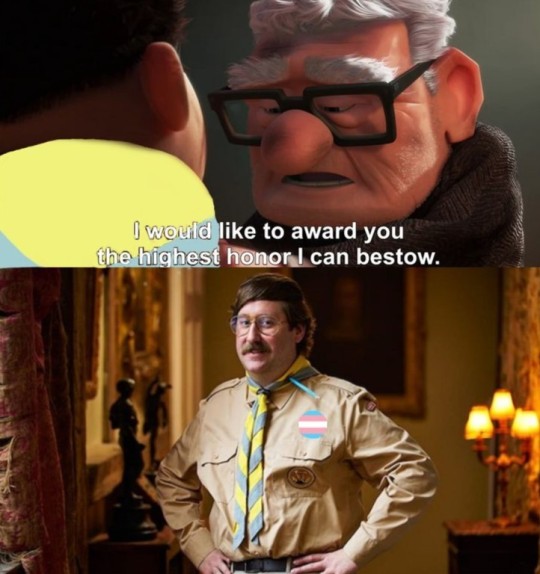
#bbc ghosts#pat butcher#patrick butcher#trans pat#my edit#i spent way too long making lol#messed around with a non adobe editing software trying vaguely to remember how to photoshop from when i took photography in high school#it's been /a while/ since that class
144 notes
·
View notes
Text
[“When I first came out as a lesbian in 1971, identity politics were so pervasive that this modality didn’t even have a name; it was simply the sea in which every queer sank or swam. One of the key assumptions of identity politics is that we can reveal in one grand social drama of coming out the absolute inner core of truth that makes up one’s “real self.” Coming out is seen as a process like peeling away the layers of an onion or the petals of an artichoke. Identity politics also assumes that your political allies will have to be people who share your identity because nobody else could understand your oppression or really be committed to fighting it; that people who share some aspects of your sexuality but not others are either afraid to come out or traitors to the cause; that it’s not possible for someone to change the way they label themselves without being dishonest or cowardly.
Now I see queer politics quite differently. I know from personal experience that I can’t trust somebody just because their sexual preferences or their gender identity resembles my own. I know we can make allies who are indignant about injustice even if it does not impinge directly upon their own lives. I see coming out as a lifelong process that proceeds as I become ready to understand and accept aspects of myself which bear lessons I need to learn at different points in my life. Each new coming out does not recreate me as a whole new person; I think some people view it this way, but this is crazy-making and too compartmentalized for me. It’s more like being able to see each and every spoke of the wheel that makes up my being, or like opening up and furnishing another new room of my soul.
I wonder what coming out would be like if we were not forced into these defensive positions of tribal loyalty and us-them thinking. What if we could say to a friend who was embarking on a new coming out, “I love you, and so I must also love this new aspect of yourself. Because I care about you I want to know more about it. Let’s both learn from this.” Instead, what usually happens is a great deal of indignation, betrayal, and rejection. I think this is because a person who is coming out threatens the identities of former acquaintances, partners, and coworkers. If someone else’s identity can be fluid or change radically, it threatens the boundaries around our own sense of self. And if someone can flout group norms enough to apply for membership in another group, we often feel so devalued that we hurry to excommunicate that person. This speaks to our own discomfort with the group rules. The message is: I have put up with this crap for the sake of group membership, and if you won’t continue to do the same thing, you have to be punished.
We seem to have forgotten that the coming-out process is brought into being by stigma. Without sexual oppression, coming out would be an entirely different process. In its present form, coming out is reactive. While it is brave and good to say “No” to the Judeo-Christian “Thou Shalt Nots,” we have allowed our imaginations to be drawn and quartered by puritans. I believe that most of the divisions between human sexual preferences and gender identities are artificial. We will never know how diverse or complex our needs in these realms might be until we are free of the threat of the thrown rock, prison cell, lost job, name-calling, shunning, and forced psychiatric “treatment.”
I do not think human beings were meant to live in hostile, fragmented enemy camps, forever divided by suspicion and prejudice. If coming out has not taught us enough compassion to see past these divisions, and at least catch a vague glimpse of a more unified world, what is the use of coming out at all? I have told this story, not to say that anybody else should follow me or imitate me, but to encourage everyone to keep an open mind and an open heart when change occurs. The person who needs tolerance and compassion during a major transformation may be your best friend, your lover, or your very self. Bright blessings to you on the difficult and amazing path of life.”]
patrick califa, from layers of the onion, spokes of the wheel, from a woman like that: lesbian and bisexual writers tell their coming out stories, 2000
259 notes
·
View notes
Text

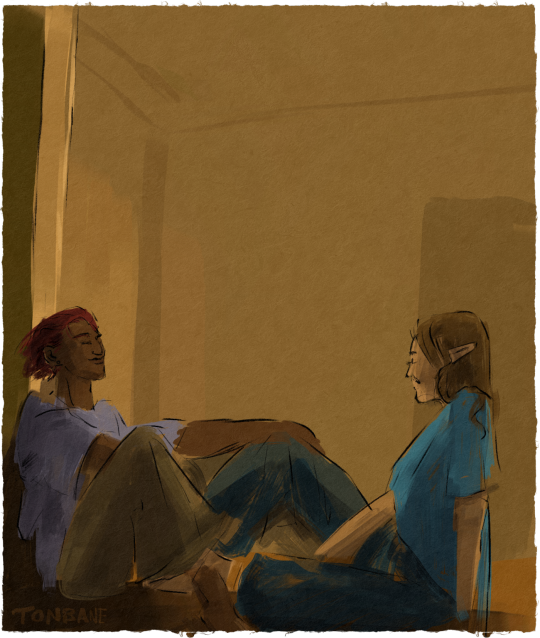
This is how that one frolic day ended for my oot college AU Gan and Link :3c... It even seems like they get along hm?
(check image descriptions 👀)
Reblog to invite to dinner that guy from class that you're not obsessed with 🌞
#oot college au#ganlink#college au#link#ganondorf#oot#ocarina of time#loz#tloz#nb link#trans link#loz au#ganon#oot ganondorf#oot link#tonbane#zelda#the legend of zelda#hihihi im even measuring how much they should even touch eachother. just a knee pat#they already hugged in the other post lets not go crazy#trans ftm link#ftm link#nonbinary link
66 notes
·
View notes
Text
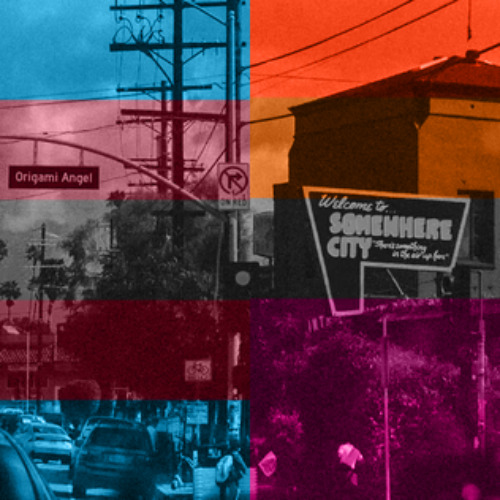
Somewhere City by Origami Angel is a Transgender Lesbian!
requested by @ppgirl420
#request#album#somewhere city#transgender#trans#lesbian#origami angel#Ryland Heagy#Pat Doherty#emo#math rock#indie rock#pop punk#easycore#indie#2019
31 notes
·
View notes
Text
Regarding that whole terf being like "I can totes tell which is a real vulva just by looking at it" thing, people are covering the transmisoginy but I've noticed no one is talking about how anti-porn views are playing into how this terf views bodies
Like, their is clearly a reactionary "only bigger inner labia are real, everything is surgical" thing going on here which obviously stems from the (legitimate!) Complaints about lack of genital diversity in porn (and inner labia size was a huge point of discussion a few years back). And like, radfems being radfems, decided at the time that the appropriate response was to decide anyone with this more favoured-by-mainstream-porn kind of vulva are evil and should be mocked and probably got surgery (even if they didnt) which makes them a traitor to women etc etc
And this is not to say that this specific instance is actually an attack on anyone but trans women (though the "real vs fake women" narrative *is* something also applied to sex workers of any gender, including cis women, by radfems) but rather I feel it is something to be aware of especially considering how anti-sex work sentiment affects overly sexualised groups (trans women) and groups who engage in sex work more frequently (also trans women)
#word of god#also like kind of a dig#but this is actually very obvious and i feel the fact ppl arent noticing it shows again just how lacking most ppls knowledge of#the dangers of radfems is#its more than just terfs and transmiosginy people!#and even if you *only* care about trans women#its more than just terfs and transmisogoiny that affects trans women!#radical feminism is a plague upon us and ppl ignore it and fall for it too easily#but pat themsepves on the back amd think theyre safe cus they called out a terf engaging in teansmisoginy#thats not enough!
178 notes
·
View notes
Text
pride month claims another bigot! fuck you, pat robertson!


#keep up the body count#pat robertson#bigot#dead bigots are the best bigots#lgbt#lgbtq#lgbqti#queer#trans#celebration#pride month#2023#christian nationalism#evangelical#christianity
101 notes
·
View notes
Text
of course there's a difference between historical terfs (cf. janice raymond and friends) and the professional transphobes funded by christians nationalists that we have today but don't act like there was no correlation at all and dworkin and rich would be trans allies nowadays. you're embarrassing yourself...
radfems been calling butch lesbians and transmasc people "self-hating women" since radical feminism existed. search "sex wars" on google scholar. this sex-negative and anti-butch period of radical feminism is well documented by Jack Halberstam ('Female Masculinity' (1998)), Pat Califa (cf 'Public Sex: The radical culture of radical sex' (1994)) and Gayle Rubin. like, in general, listen to transmasc people who've been there back in the days.
#transmasc history#terf#anti transmasculinity#transandrophobia#trans#trans history#adrienne rich#andrea dworkin#pat califa#gayle rubin#jack halberstam#radfem#tirf#butch lesbian#butch male
69 notes
·
View notes
Text
Thinking about Kitty's flashbacks and how she replaced everyone with the other ghosts (ie imaging Alison as Eleanor), and how Pat appears like this
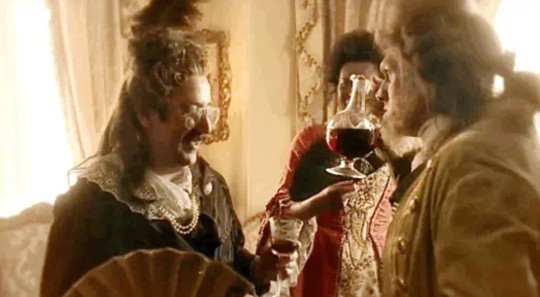
which means some part of her mentally looked at Pat and went 'put that man in a dress and give him a fan', and she was very right for that
#in my canon pat made a few comments about how pretty kitty's dress looked and occasionally gazed longingly#and she very much noticed that and decided he can wear one in my flashback. as a treat#because none of the other actors are playing another gender. just pat#trans icon tbh
89 notes
·
View notes
Text
Color blind Wriothesley is pretty cool, but as a trans Wrio truther and a little known in genetics, my headcanons do not allow it
So, instead of color blind Wrio, how about…
Color blind Neuvillette?
He can only see shades of magenta and cyan lmao (it’s called tritanopia)
…
Edit: yes, I know women can also be color blind but it’s extremely rare. Not impossible, but rare
#pat talks#neuvillette#genshin headcanons#genshin impact#genshin neuvillette#color blind Neuvillette#tritanopia#color blindness#trans Wriothesley#wriothesley#genshin wriothesley
24 notes
·
View notes
Text
Trans Pat means everything to me
#shoutout to everyone who has written pat as trans#it makes my heart so happy#pat butcher#bbc ghosts#trans pat butcher
30 notes
·
View notes
Text
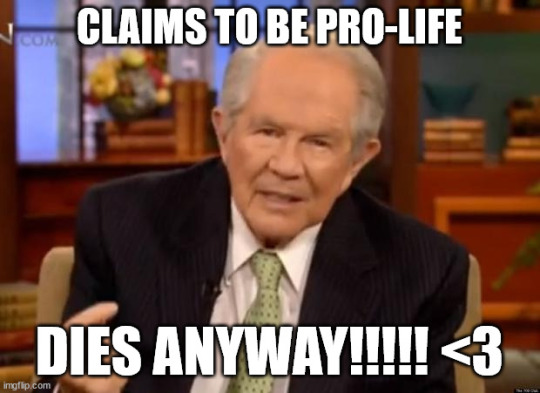
#pat robertson#abortion#lgbt#queer#gay#trans#lesbian#bisexual#lgbtq#just trying to spread the word <3#mine
98 notes
·
View notes
Text
[“Coming out was very lonely. I had very few friends. Most of the adult lesbians I knew were alcoholics, chronically unemployed, prone to violence, self-hating, apolitical, closeted, cliquish. Lesbians hated each other. If you found a lover you stopped going to the bar because you could not trust other lesbians; they would try to break up your relationship. My first woman lover went into the military, where she turned in other lesbians so she would not be exposed. One of my dyke friends got a job as a supervisor in a cabinet-making company and refused to hire lesbians because, she said, they were unreliable employees who were disliked by the other workers. The only thing that seemed worse to me than the apolitical lesbian community I came out in was the strangulation of pretending to be straight. I came out only because I could not go back; there was no place for me to stand in the het world. I was driven out.
Moving to San Francisco improved things somewhat. There was more public lesbian space there—six bars instead of one. But it did not alleviate the loathing with which my family viewed me. Nor was San Francisco in the early seventies any sort of gay utopia. We had no gay-rights law, queer bashing was a frequent event, and everyone had lost at least one job or been denied a place to live. It was a relief to be surrounded by other lesbian feminists, but only to a point. Bar dykes and feminists still had contempt for one another. Feminism rapidly became a way to reconstitute sexual prudery, to the point that it seemed to me that bar dykes were actually more accepting of and knowledgeable about the range of behavior that constituted lesbianism. In the bars or in the women’s movement, separatism was pretty much mandatory, if you didn’t want to get your ass kicked or be shunned. Separatism deteriorated into a rationalization for witch hunts in the lesbian community rather than a way for women to bond with one another and become more powerful activists. The lesbian community of that decade did terrible things to bi women, transgender people, butch/femme lesbians, bar dykes, dykes who were not antiporn, bisexual and lesbian sex workers, fag hags, and dykes who were perceived as being perverts rather than über-feminists. We were so guilty about being queer that only a rigid adherence to a puritanical party line could redeem us from the hateful stereotypes of mental illness and sexual debauchery.
What did I gain? I came a little closer to making my insides match my outsides, and that was no small blessing. The first time I met other dykes I recognized a part of myself in them, and knew I would have to let it out so I could see who I was. For a time, being a lesbian quieted my gender dysphoria because it made it possible for me to be a different kind of woman. That was an enormous relief.
For a long time, I hoped that by being strong, sexually adventurous, and sharpening my feminist consciousness, I could achieve a better fit between my body and the rest of me. Lesbianism was a platform from which I could develop a different sort of feminism, one that included a demand for sexual freedom and had room for women of all different erotic proclivities. I had a little good sex and discovered that I was not a cold person, I could love other people. It was as a lesbian that I began to find my voice as a writer, because in the early days of the women’s movement, we valued every woman’s experience. There was a powerful ethic around making it possible for every woman to speak out, to testify, to have her say. But there were always these other big pieces of my internal reality that lesbianism left no room for.
The first big piece of cognitive dissonance I had to deal with, in my second coming out, was S/M. I date my coming out as a leather dyke from two different decisions. One was a decision to write down one of my sexual fantasies, the short story that eventually became “Jessie.” At the time I wrote the rough draft of that story, I had never tied anybody up or done anything else kinky. I was terribly blocked as a writer. I kept beginning stories and poems that I would destroy. I have no idea if they were any good or not. My self-loathing was so intense, my inner critic so strong, that I could not evaluate my own work.
So I decided to write this one piece, under the condition that I never had to publish it or show it to another person. I just wanted to tell the truth about one thing. And I was badly in need of connecting with my own sexuality since I was in the middle of what would be a five-year relationship with a woman who insisted we be monogamous, but refused to have sex with me. So I wrote about dominance and submission, the things I fantasized about when I masturbated that upset me so much I became nauseated. Lightning did not strike. As I read and reread my own words, I thought some of them were beautiful. I dared show this story to a few other people. Some of them hated it. Some of them were titillated. Nobody had ever seen anything like it before. The story began to circulate in Xerox form, lesbian samizdat. I found the strength to defend my story when I was told it was unspeakable or wildly improbable.
In October of 1976, I attended a lesbian health conference in Los Angeles and went to a workshop there about S/M. In order to go to a workshop, you had to sign a registration sheet. I was harassed by dykes who were monitoring this space to see who dared sign up for that filthy workshop. On my way, I had to walk through a gauntlet of women who were booing and hissing, calling names, demanding that the workshop be canceled, threatening to storm the room and kick us all out of the conference. The body language and self-calming techniques I had learned when I had to deal with antigay harassment on the street came in very handy, but how odd it was to be using those defenses against the antagonism of other dykes. Their hatred felt like my mother’s hatred. I am so glad I did not let it stop me.
When I got home from that workshop, I knew that I was not the only one. Not only were there other lesbians who fantasized about sadomasochism, there were women who had done these things with each other. I decided to come out again. If there were other leather dykes in San Francisco, they had to be able to find me, so I had to make myself visible. This meant that I often did not get service at lesbian bars, or I was asked to leave women-only clubs and restaurants. I was called names, threatened, spit at. I got hate mail and crank calls. But I also found my tribe. And because I had already experienced my first coming out, I knew we were not going to be an ideal, happy family. I could be more patient with our dysfunctions, and see them as the result of being scared, marginalized, kicked around. Being a leather dyke took me another step closer to dealing with my gender issues. I could experiment with extreme femme and extreme butch drag; take on a male persona during sex play. I gave up separatism because I needed to take support from any place where it was available. Gay men already had a thriving leather culture, and I wanted to learn from them. I also wanted to have sex with them. It still wasn’t okay as far as lesbian feminism was concerned to be bisexual, to be transgendered, but I could bring those folks into my life and make alliances with them. I could defend them in print. There was even more good sex, and people who loved me and received my love despite the fact that it was dangerous for us to show ourselves to one another. I faced my sexual shadow, and she bowed to me and then danced beautifully in profile against the white walls of my consciousness. My writer’s voice was unlocked.”]
pat califa, from layers of the onion, spokes of the wheel, from a woman like that: lesbian and bisexual writers tell their coming out stories, 2000
#pat califa#bi literature#lesbian literature#trans literature#history stuff#gender stuff#terra preta
169 notes
·
View notes
Text


I been drawing other stuff a lot and didn’t get to draw
A silly man
43 notes
·
View notes
Text
Silly little ballpoint pen sketches of my silly little dead people

#bbc ghosts#the captain#pat butcher#silly little dead gay army man#with the silly little dead bisexual scout master#also they’re both trans because I said so#they’re so silly#and gay#for each other#patcap
79 notes
·
View notes
Text
youtube
Thalia Tran talks about playing Mai in Netflix’s Avatar The Last Airbender series, working with Elizabeth Yu and Momona Tamara who play Azula and Ty Lee, her favorite character from the animated Nickelodeon series and MUCH more in this exclusive behind the scenes look at Netflix’s Avatar The Last Airbender with Pop Culture With Pat!
15 notes
·
View notes
Text
trans Pat, trans Pat, I know your not real but I love you
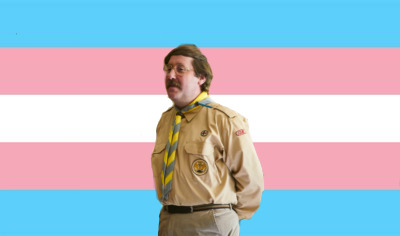

#bbc ghosts#bbc ghosts pat#ghosts bbc#pat butcher#Trans Pat butcher#trans man#Trans#I love pat and I'm trans I love trans Pat head cannons so much I love them#he is me fr
15 notes
·
View notes